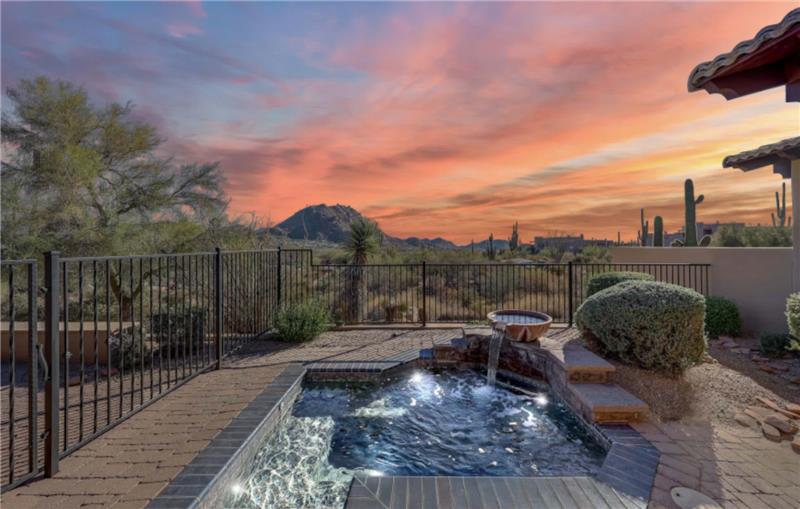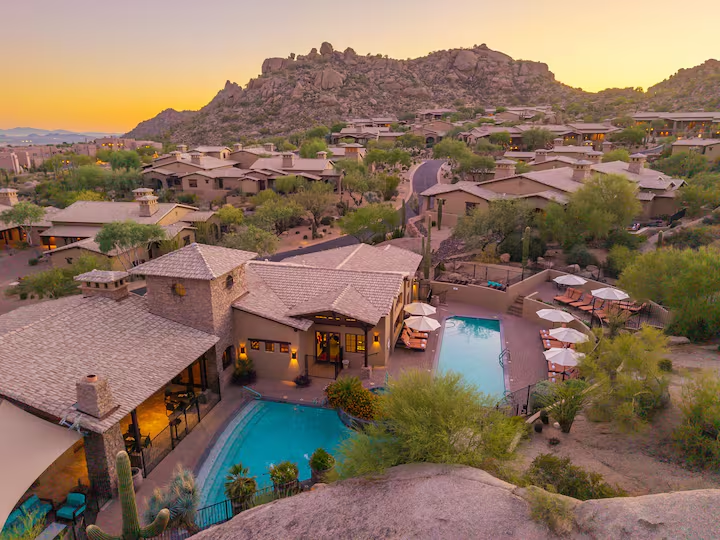Fractional Ownership Guide (with Pros and Cons)
Discover the essentials of fractional ownership in real estate, encompassing its definition, advantages, and challenges, offering a strategic guide for potential investors. In this article, you will learn: - The definition and workings of fractional ownership - Pros and cons of fractional ownership - Comparisons with timeshare, full ownership, vacation rental, condotel, destination and vacation clubs, and private residence clubs - Key considerations for prospective fractional owners

Navigating Fractional Ownership and Co-Investing in Properties
Fractional ownership offers a distinctive approach to acquiring high-value assets, like vacation homes, by allowing individuals to own a share without the full responsibilities of ownership. This article aims to unpack fractional ownership comprehensively, examining its benefits and drawbacks, contrasting it with other property ownership models, and illustrating with real-world examples to aid informed decision-making.
Targeted at potential investors and personal users, this guide will navigate the intricate world of fractional ownership, providing insights into its feasibility and cost-effectiveness for accessing luxury real estate. We will objectively analyze the merits and challenges of fractional ownership, ensuring readers can assess its suitability for their investment goals and personal preferences.
Join us as we delve into the captivating realm of fractional ownership, guiding you through its intricacies to determine if it aligns with your real estate aspirations.
What is Fractional Ownership?
Fractional ownership is a unique real estate arrangement that allows multiple individuals to share ownership of a property. Instead of purchasing the property outright, buyers acquire a fraction of the asset, typically represented as a percentage. This shared ownership model provides several benefits, including reduced costs and increased access to desirable properties in sought-after locations.
How Does Fractional Ownership Work?
In a fractional ownership arrangement, the property is divided into shares, with each owner holding a specific percentage of ownership rights. These shares are often structured as deeded interests, providing owners with legal ownership of the property. Each owner has the right to use the property for a designated period, typically based on the percentage of ownership held.
For example, if a property is divided into four shares, each owner would have the right to use the property for three months out of the year. This allocation of usage time is usually predetermined and may rotate annually to ensure fairness among owners.
Practical Examples of Fractional Ownership
Fractional ownership is commonly used in the vacation home industry, where buyers pool their resources to purchase a luxury property. By sharing ownership, individuals gain access to high-end vacation homes that would otherwise be unaffordable on an individual basis.
For instance, a group of friends may decide to purchase a beachfront villa together, dividing the costs and responsibilities of ownership. Each owner can enjoy the property for a specified period each year, allowing for shared enjoyment of the asset.
Overall, fractional ownership offers a flexible and cost-effective approach to property ownership, making it an attractive option for individuals seeking access to premium real estate without the burden of sole ownership.
Pros and Cons of Fractional Ownership

To better understand fractional ownership, it's crucial to grasp the various advantages and disadvantages associated with this unique property ownership model.
Fractional Ownership Advantages (Pros)
- Diversification: Fractional ownership allows investors to diversify their portfolios by investing in high-value properties without bearing the full financial burden.
- Access to Luxury Assets: Investors can access luxurious properties that would otherwise be financially out of reach on an individual basis.
- Shared Expenses: Co-owners can split the costs associated with property acquisition, maintenance, and management, reducing the financial burden on individual investors.
- Flexibility: Fractional ownership offers flexibility in usage, allowing owners to use the property for a specified period each year based on their ownership percentage.
- Potential Rental Income: Owners of fractional properties may have the opportunity to earn rental income when the property is not in use, providing an additional revenue stream.
Fractional Ownership Disadvantages (Cons)
- Coordination Challenges: Coordinating usage schedules among multiple owners can be challenging and may lead to conflicts or disagreements.
- Limited Control: Fractional owners have limited control over the property's management and decision-making processes, as decisions often require consensus among co-owners.
- Depreciation Risk: Like any real estate investment, fractional ownership carries the risk of property depreciation, which can affect the property's overall value over time.
- Potential for Disputes: Disputes among co-owners, such as disagreements over property management or usage rights, can arise and may require legal intervention to resolve.
Fractional vs Other Ownership Types

To explore the landscape of fractional ownership and how it contrasts with other types of property investments, it’s essential to delve into the nuances of each model. Fractional ownership offers a unique approach to real estate investment by allowing individuals to own a part of a property, sharing both costs and benefits. This model stands in stark contrast to timeshares, full ownership, and vacation rentals, each with its own set of characteristics and investment implications. Understanding these differences is crucial for investors seeking the right fit for their financial goals and lifestyle preferences.
Fractional Ownership vs Timeshare
Fractional ownership differs from timeshare in that fractional owners have a tangible stake in the property, entitling them to a portion of its appreciation and potential rental income. Unlike timeshares, where buyers typically have access to the property for a specific period each year without ownership rights, fractional ownership provides legal ownership rights and a more significant investment potential.
Fractional Ownership vs Full Ownership
While full ownership grants complete control over a property, fractional ownership allows individuals to share ownership with others, reducing the financial burden and management responsibilities. Full ownership may be preferable for those seeking sole decision-making power and control over their property, while fractional ownership offers a cost-effective alternative for accessing high-value assets without assuming the entire financial responsibility.
Fractional Ownership vs Vacation Rental
Fractional ownership provides co-owners with legal ownership rights to a property, allowing them to use it for a specified period each year and potentially earn rental income. In contrast, vacation rentals typically involve short-term stays where guests pay for temporary accommodations but do not acquire any ownership rights. While fractional ownership offers long-term investment potential and shared expenses, vacation rentals offer flexibility in terms of location and duration of stay without the commitment of ownership.
Fractional Ownership vs Condominium Hotels (Condotels)
Fractional ownership offers investors a share in the property's equity and potential profits, while condominium hotels involve buying a unit within a hotel and sharing in rental income generated by the hotel's operation. Condotels provide a unique blend of real estate investment and hospitality benefits, allowing owners to use their units for personal vacations while earning income when not in use. However, condotel owners may have less control over the management and use of their property compared to fractional ownership, where owners have more say in the property’s management due to their direct stake in the asset.
Fractional Ownership vs Destination Club and Vacation Club
Fractional ownership provides a deeded share in a specific property, offering tangible assets and potential income generation. In contrast, destination and vacation clubs offer access to a portfolio of properties, providing flexibility and variety in location without actual ownership of a single property. These clubs often require a membership fee and ongoing dues but do not confer real estate equity to the members, which distinguishes them from fractional ownership that allows for direct equity in a property and potential appreciation benefits.
Fractional Ownership vs Private Residence Club
Private residence clubs are a form of fractional ownership offering luxurious amenities and services in prime locations, but with more exclusivity and often at a higher cost. These clubs allow individuals to own a fraction of a high-end property, with access to the property for a certain number of days or weeks per year. The key difference is the level of luxury and service provided in private residence clubs, which can include concierge services, high-end furnishings, and exclusive facilities, offering a more upscale experience compared to traditional fractional ownership.
8 Tips for Prospective Fractional Owners

Embarking on fractional ownership involves strategic planning and a thorough understanding of the market. Here are essential tips for potential fractional owners to evaluate opportunities, manage co-owner relationships, and maximize investment returns:
- Conduct Due Diligence: Before investing, thoroughly research the property's location, market trends, and potential for appreciation. Assess the financial health of the property, including any outstanding debts or liens that could affect your investment.
- Understand the Legal Structure: Know the legal framework governing the fractional ownership. This includes the terms of the agreement, ownership structure (such as an LLC or partnership), and your rights and responsibilities as an owner.
- Evaluate Management and Operation: Investigate how the property will be managed, who will handle day-to-day operations, and the track record of the management company. Good management can significantly influence the property's profitability and your overall experience.
- Financial Planning and Budgeting: Be clear about the initial investment required, ongoing costs, and potential future expenses. Budget for maintenance, property taxes, and management fees to avoid unexpected financial burdens.
- Consider Exit Strategies: Have a clear understanding of how you can exit the investment, including the process for selling your share, any restrictions on resale, and the potential market for your share.
- Build Relationships with Co-Owners: Establish good communication and relationships with other co-owners to facilitate decision-making and conflict resolution. Consider creating a co-owners' agreement that outlines how decisions will be made, usage schedules, and how disputes will be resolved.
- Plan for Personal Use vs. Rental: Decide how much you plan to personally use the property versus renting it out. This decision will impact your financial returns and personal enjoyment of the property.
- Stay Informed and Involved: Regularly review the property's performance, attend owner meetings, and stay engaged with the management to ensure your investment is being well managed.
By following these tips, prospective fractional owners can make informed decisions, effectively manage their investments, and maximize their returns in the fractional ownership market.
Things to Know About Fractional Ownership

Q: What is fractional ownership?
A: Fractional ownership allows multiple individuals to share ownership of a property, providing them with legal ownership rights and usage privileges for a designated period each year.
Q: How does fractional ownership work?
A: In fractional ownership, the property is divided into shares, with each owner holding a specific percentage of ownership rights. Owners typically have predetermined usage rights based on their ownership percentage.
Q: What are the benefits of fractional ownership?
A: Fractional ownership offers reduced costs, increased access to high-end properties, and shared responsibilities for maintenance and expenses among co-owners.
Q: Are there any drawbacks to fractional ownership?
A: Some potential drawbacks include the need for coordination among co-owners for scheduling usage, potential conflicts among owners, and limitations on property customization.
Q: How is fractional ownership different from other property ownership models?
A: Unlike timeshares or vacation rentals, fractional ownership provides co-owners with tangible ownership rights, potential investment opportunities, and a stake in the property's appreciation and rental income.
Q: How do I decide if fractional ownership is right for me?
A: Consider your individual preferences, financial situation, and long-term objectives to determine if fractional ownership aligns with your needs and lifestyle.
Let's Recap!
As we wrap up our journey through fractional ownership, it's clear that this unique property ownership model offers a blend of opportunities and challenges. We've explored its potential to unlock access to luxurious properties, trim acquisition costs, and provide flexibility in property usage. But, we've also touched on the importance of navigating shared ownership dynamics, including potential conflicts and customization limitations.
Ultimately, deciding if fractional ownership is right for you hinges on your preferences, financial standing, and long-term goals. By weighing the pros and cons outlined here, you'll be equipped to make a well-informed choice that suits your lifestyle and investment aspirations.
Ready to take the next step? Schedule a meeting with our team. Let's chat about how fractional ownership can fit into your real estate journey.
Keep reading







